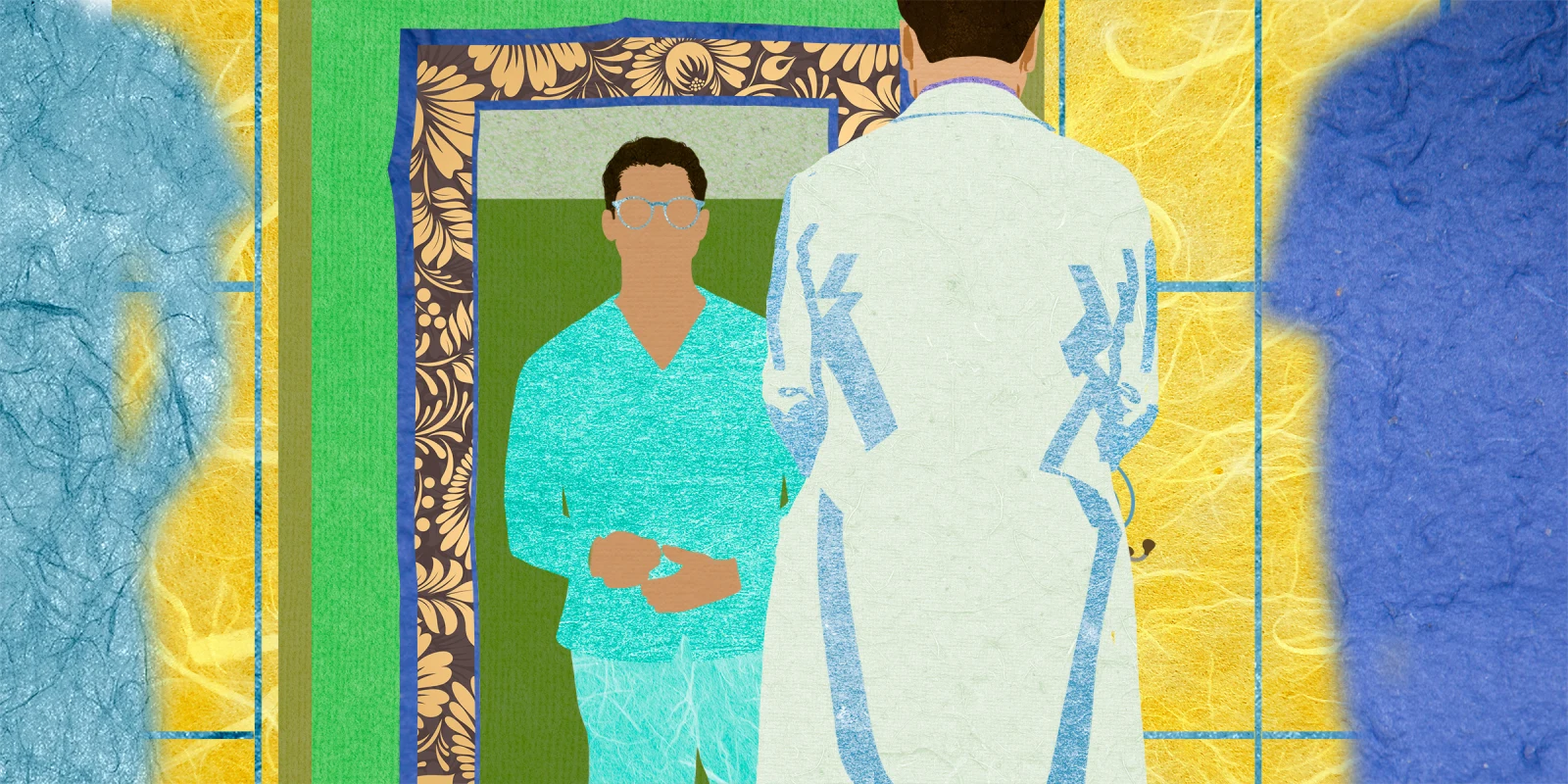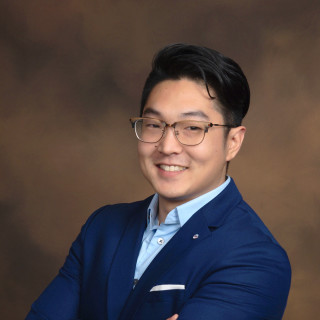"He cheers me up," he smirks at my attending, who gives me an approving nod. His green psych pajamas, the ones that all our patients are “restricted” to on the unit, are slightly wrinkled, loosely draped; in a word: ill-fitting. In that moment, I can imagine seeing him in a local donut shop picking up a fresh-fried dozen and a box of coffee for his buddies at work, cracking jokes with the cashier. It’s all in that smirk. He looks back at my attending and the smirk disappears. The moment passes. We’re back on the psych unit.
I’ve just started residency. Like many of us, it’s been (give or take) four years since I started medical school and many more since I made the decision to become a doctor. I’m also what is considered “non-traditional,” since being a doctor was never my original intention. I say all of this just to provide a bit of context for this next bit: I never really thought I’d become a doctor. Not that I thought I wouldn’t “make a good doctor,” I just never imagined that there existed any reality in which I was a doctor. I always thought of myself as a teacher, a writer, or better yet, some kind of nomadic jack-of-all-trades bartering manual skills and fighting bad guys while traveling back and forth on the sparsely populated throughways of the American Southwest. I may have watched too many "Kung Fu" shows as a kid.
“I’ve been working on this for 20 years, Doc. I’ve seen others like me, older than me, they go in, they get out, they go back in, they struggle, they fight, they get tired, they never win. They never win.” My attending had simply asked him if he wanted to be in a substance abuse treatment program. “I don’t want to end up like that. I’m ready to make a change.” I see him again. This time he’s in his home, in front of a mirror, thinking, I’m ready to make a change. I look in the mirror. I see myself.
I blink, we’re back on the unit.
I rarely saw myself in my patients, but that day, I did. And what I saw was a mirror. But this was no simple reflection of the last few nanoseconds of my past; I saw the change of years in this mirror. What I saw was the last four years of my life: medical school, marriage, moving from state to state, rotation to rotation, examination to examination to examination, to graduation. And finally, here, on the psych unit.
At first, I saw my past self. In his fear of failure, I saw my own; in his anxiety, I saw the same. And in his determination to get better, I saw the same kind of hope I had when I first started medical school. It wasn’t the first time I had identified with a patient, of course. Medical school is filled with face-to-face encounters with people of all ages, races, conditions, and circumstances. But the encounters were the very definition of perfunctory: they were there to seek help for a problem, I’d tell them what I knew, and I'd move on. As a student, my preceptors rarely expected more than that from me. For myself, I always felt more concerned about upcoming exams, interviews, and extracurriculars. There was rarely room for anything else. Now, with the years of study, examinations, traveling, moving, and occasional desperate uncertainty about my future trailing behind me, I apparently had time to actually see my patient. And what I saw was how far I had come.
I used to think I was lucky to be able to so rationally pinpoint the moment I decided to be a doctor — a moment when I was a bit worn, a bit jaded, and lucidly dissatisfied with the path I was on. I had just finished two years working at the bench as a cell culture technician in an academic research lab, with no biology, chemistry, or other hard science higher education. Seeing my name on an academic paper, in a journal, I realized I had wasted so much time convincing myself I couldn’t do more — that I couldn’t read more, learn more, understand more, and probably work more. And in fact, I actually enjoyed it. Even more so, I thought that as a doctor I would be intellectually and financially rewarded for it. It just made good sense.
As a student, it gave me a great deal more clarity when I felt overwhelmed by material, it made making decisions like “sleep vs. study” mentally uncomplicated, and kept me from being reckless in my approach to choosing a specialty. The common complaints and pitfalls that I heard from my cohort didn’t feel like the “identity crises” or “great sacrifices” they painted them as. They were simply tasks to be done. I distinctly remember replying to a friend who asked, “Med school must be rough, huh?” with: “Not really. I only have to worry about two things: the shit I need to do, and the amount of time I have to do it in.” No room for anything else.
Unsurprisingly, as a clinician, it kept my connection to patients far too clinical: even as a medical student I still remember feeling very much aware that at some point this was going to be a job, that patients were clients, and often thinking, I’m just here to get a job done. In many ways, my decision to become a doctor was almost too rational, too well-thought-out, and as a result I simply saw patient encounters as means to an end. So the commonalities I had with patients were seen as fodder for good rapport, never as grounds for identifying with them. That day, I did.
In that reflection I saw who I was four years ago. Not just hopeful, but naive. Not just fearful, but desperate. In the void that suddenly appeared after the crush of deadlines, high-stakes examinations, interviews, and applications dissipated, the reason I became a doctor (dare I say, any of us becomes a doctor) became abundantly clear: I am here to help a person in pain, in crisis, on a difficult path, looking for hope, or just asking for an explanation. A person who I was four years ago. A person who I may be four years from now. A person who I may be even tomorrow.
The lowest points of my time in medical school were always poisoned by thoughts of what am I really doing this for? Was it my parents, my community, or maybe even just my ego? My self-worth? In other times the question was just a “WHY,” which was honestly more just a sigh of despair that happened to sound like a question. But in that moment, when I saw some part of myself reflected in my patient, I realized I had never really understood that question, that “why.” This arduous journey that so many of us have shared is so incredibly personal that we often forget that adversity, obstacles, pain, and uncertainty are the essence of the job that we’ve chosen. Every patient we see is in the middle of their arduous journey, as we once were and might be again. But what’s also true, and what I also saw, is that the relief, the calm, the triumph, and the comfort that I feel now (at least, more often than I did in medical school) is what we can bring to patients.
“How’ve you been, Doc?” It’s been a month since I saw him in those ill-fitting pajamas. His face is bright and a few good laughs punctuate our conversation. “I’m feelin’ good,” he continues. “Things are getting better. They ain’t perfect, nothing’s perfect, but they are getting better.” He has actually brought me a glazed donut and a cup of coffee, which is nice. We chat, I review his medications, he thanks me, and I get ready for my next patient. As he is leaving, I watch him joke with the staff. A smirk flashes across his face, then a laugh, which blooms into a full-blown smile.
I catch his eye. He sees me, I see him.
I see myself smiling right back.
Tim Hsu, MD is a big ball of yarn. He spends most of his time being batted around by his cat. In his free time he reads, plays video games, and occasionally gets some work done. You know, just a typical psychiatry resident. He is a 2020–2021 Doximity Op-Med Fellow. Dr. Hsu has no conflicts of interest to disclose.
Illustration by Jennifer Bogartz







